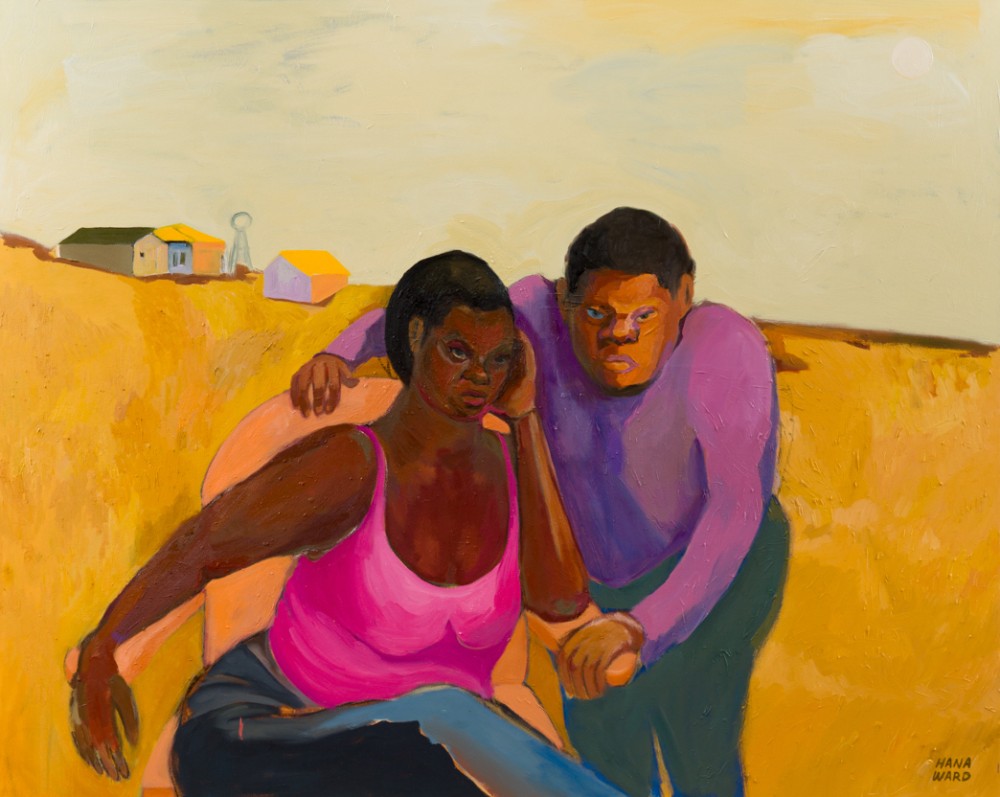
HANA WARD: HOW TO BUILD UP WORN OUT SOILS
Borrowing from George Washington Carver’s pamphlet of the same name, How To Build Up Worn Out Soils speaks to a theme Ward has been mining in her work for years: self-determination and transformation despite limited resources. In the wake of those overlapping pandemics—Covid, climate anxiety, and the resurgence of old rage about persistent systemic racism, Ward reached for books to help gain perspective. Her study found her at the intersection of Black land justice and spirituality. Freedom Farmers by Monica M. White (2018), Leah Penniman’s Farming While Black (2018) and Tricia Hersey’s Rest Is Resistance: A Manifesto (2022) sowed the seeds and How To Build Up Worn Out Soils represents a harvest—the yield from a particular season of reading, meditating, praying, and then painting and sculpting.
Like many of Ward’s titles, this one is polysemous—worn out soils refers to both our minds and our environments. Ward considers the ways subsistence farming has historically provided a path toward Black socio-political self-determination, and that self-determination, a catalyst for self-possession. Ward extends this practical labor of place-making and turns it inward to the ethereal, our minds and internal worlds: nurturing the seeds of divinity within each of us, cultivating our energy fields, and enriching our lives in the process. To Ward, Carver and Fannie Lou Hamer inspire beyond their scientific discoveries and community organizing, they demonstrate a progressive understanding of (or relationship with) reality. “I’m interested in what they understood about their own spirit,” says Ward, “and how that influenced how they shaped their own reality.”
Ward’s work addresses a concept referred to as other/wise—other, which is to say alternative, ways of knowing [in] the world. Citing Hersey’s question, “how can we access pleasure and joy and liberation if we’re too tired to experience it?” Ward wonders, “when deprivation is used as a tool for oppression, what does it then do to our minds, our psyches, our understandings of reality, to collaborate with the earth to create our own nourishment? What can we yield when we collaborate with others to collectively design systems to thrive in?” With these questions as a foundation for the studio, Ward’s paintings and ceramics honor the long legacy of Black and indigenous contributions to the agricultural canon.
Paintings and their titles form a syllabus: beyond Carver, there are references to the indigenous practice of companion planting, Tuskegee University, the Bhagavad Gita, and multiple invocations of Fannie Lou Hamer’s Freedom Farms Cooperative. Ward’s attention to the history of Black farmers in America is timely. A recent lawsuit filed by the National Black Farmers Association* against the USDA makes plain how systematized the obstruction of Black survival is in this country. So, what then- what do we do when we find ourselves seemingly stuck between a rock and a hard place, when no map delineates a route of escape? There are no prescriptions in How To Build Up Worn Out Soils, but Ward proffers a possibility: “You remember that you ARE Spirit. You are connected to Source Energy.” Within ourselves, we transform the soils of our minds, with our communities, we transform the soils of our environments, and in these ways, we remember our own power. Or, as another of Ward’s teachers, Reverend Deborah L. Johnson, puts it: “The slaying happens when the hero realizes that his or her power is greater than the power being projected onto the demon.”
—Bethel S. Moges
Hana Ward (b. 1989, Los Angeles, CA) received a BA from Brown University in 2011. Ward’s work has been exhibited at venues including Los Angeles Contemporary Exhibitions, Harun Gallery, Beyond Baroque, and OCHI in Los Angeles, CA; The FLAG Art Foundation in New York, NY; Mrs. in Queens, NY; The Breeder in Athens, Greece; and Pt. 2 in Oakland, CA. Ward has been the recipient of a 2023 Hayama Artist Residency and a 2017 Los Angeles Department of Cultural Affairs Artist-in-Residence Grant. Ward’s work has been featured in various publications including Artforum, Frieze, The New York Times, Los Angeles Times, Financial Times, Amadeus, Artillery Magazine, and AUTRE. Ward currently lives and works in Los Angeles, CA is represented by OCHI.
*In conjunction with How To Build Up Worn Out Soils, Hana Ward has created a limited editioned T-shirt to raise funds for The National Black Farmers Association (NBFA), a non-profit organization representing African American farmers and their families in the United States. As an association, it serves tens of thousands of members nationwide. NBFA's education and advocacy efforts have been focused on civil rights, land retention, access to public and private loans, education and agricultural training, and rural economic development for Black and other small farmers.